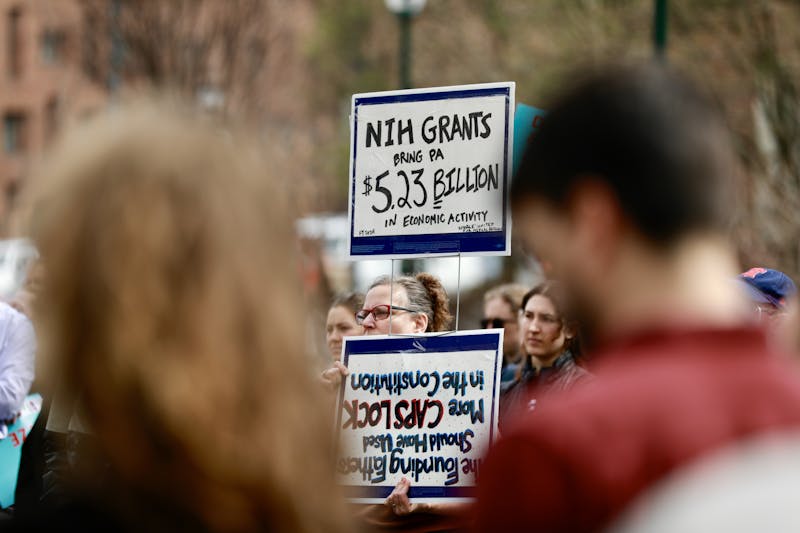
Penn's response to the Palestine Writes Literature Festival was a "significant failure," former Pennsylvania governor and 1965 College graduate Ed Rendell told The Daily Pennsylvanian on Wednesday.
Rendell joined several prominent alumni critiquing Penn's approach to the festival, which was hosted on campus but not directly organized by the University. He called on Penn President Liz Magill to establish an independent committee of experienced students, faculty, and alumni to develop standards that prevent any group that "breaches hate or the acceptable use of violence" from reserving space for events on University property.
"It's absolutely imperative that we have an independent committee that makes these judgments, because I don't think any independent committee could have looked at statements that were made and think that Penn should be associated," he said.
On Sept. 20, Magill disclosed that Penn had initiated a review of the process external groups use to reserve Penn's space and host events on campus in a letter to the Anti-Defamation League. She also said the University would improve equity and inclusion training and education programs for faculty, staff, and students to include antisemitism awareness.
The University did not respond to a request for comment about who is reviewing Penn's external event reservation policies. Penn currently has a Committee on Open Expression with a range of charges, which include recommending policies and procedures and "investigating alleged infringements of the right of open expression of any member or members of the University community."
Rendell praised the President's Office for exchanging communications with him about his concerns about the "continuing problem" of events sponsored by the University featuring speakers with a history of antisemitic rhetoric and advocacy for violence against Jewish people. Rendell added that Magill invited him to meet with her and said that he did not think Magill would resign as a result of the controversy.
There is no evidence confirmed by the DP that any speakers at the Palestine Writes festival, which took place without incident, explicitly called for violence against Jews.
Rendell also condemned allegations that Penn leaders, including University Board of Trustees Chair Scott Bok, pressured members of the trustees who were openly critical of the University to resign. Four alumni with firsthand knowledge told the DP last week that multiple trustees were allegedly pressured to step down from their board positions after publicly criticizing Penn's response to the Palestine Writes festival.
"That would just be awful," he said.
At least four current and former trustees, along with Rendell, joined over 4,000 alumni in signing an open letter last month calling for Penn to respond more strongly to the Palestine Writes festival. One of the former trustees — the Wharton School's Board of Advisors Chair Marc Rowan — called for alumni to halt their donations until Magill and Bok resign, sparking an unusual public backlash among at least a dozen of Penn's most influential donors.
Penn administrators' handling of antisemitism on campus since the Palestine Writes festival and the start of the ongoing violence between Israel and Hamas. One trustee has resigned in protest of University leadership and joined calls for their resignation.
Some of Penn's most well-known donors have sent letters to Magill, including 1987 College graduate Jon Huntsman Jr. and 1965 Wharton graduate Ronald Lauder. Both Huntsman and Lauder accused the University of providing an unsatisfactory response to the ongoing violence between Israel and Hamas and last month's Palestine Writes festival, prompting their decisions to withhold or threaten to halt funds.
In response to a request for comment about the turmoil, Magill wrote to the DP that alumni "are important members of the Penn community."
"I hear their anger, pain, and frustration and am taking action to make clear that I stand, and Penn stands, emphatically against the terrorist attacks by Hamas in Israel and against antisemitism," Magill wrote.
Magill has condemned antisemitism in three additional University messages since the violence between Israel and Hamas began.
She added that the University supports and encourages "the free exchange of ideas, along with a commitment to the safety and security of our community and the values we share and work to advance."
Rendell served as mayor of Philadelphia from 1992 to 2000, chair of the Democratic National Committee from 1999 to 2001, and governor of Pennsylvania from 2003 to 2011. He currently teaches PSCI 1207: "Who Gets Elected and Why? The Science of Politics" at Penn.
Professors at Penn have had mixed reactions to the ongoing retaliation among donors and alumni, with Penn's Faculty Senate tri-chairs writing in a statement to all faculty on Thursday that academic freedom must "remain free from internal or external pressure or coercion" and is not a "commodity that can be bought or sold by those who seek to use their pocketbooks to shape our mission."
Values of free speech "are being threatened by individuals outside of the University who are surveilling both faculty and students in an effort to intimidate them and inhibit their academic freedom," the tri-chairs wrote.
The Daily Pennsylvanian is an independent, student-run newspaper. Please consider making a donation to support the coverage that shapes the University. Your generosity ensures a future of strong journalism at Penn.
Donate






